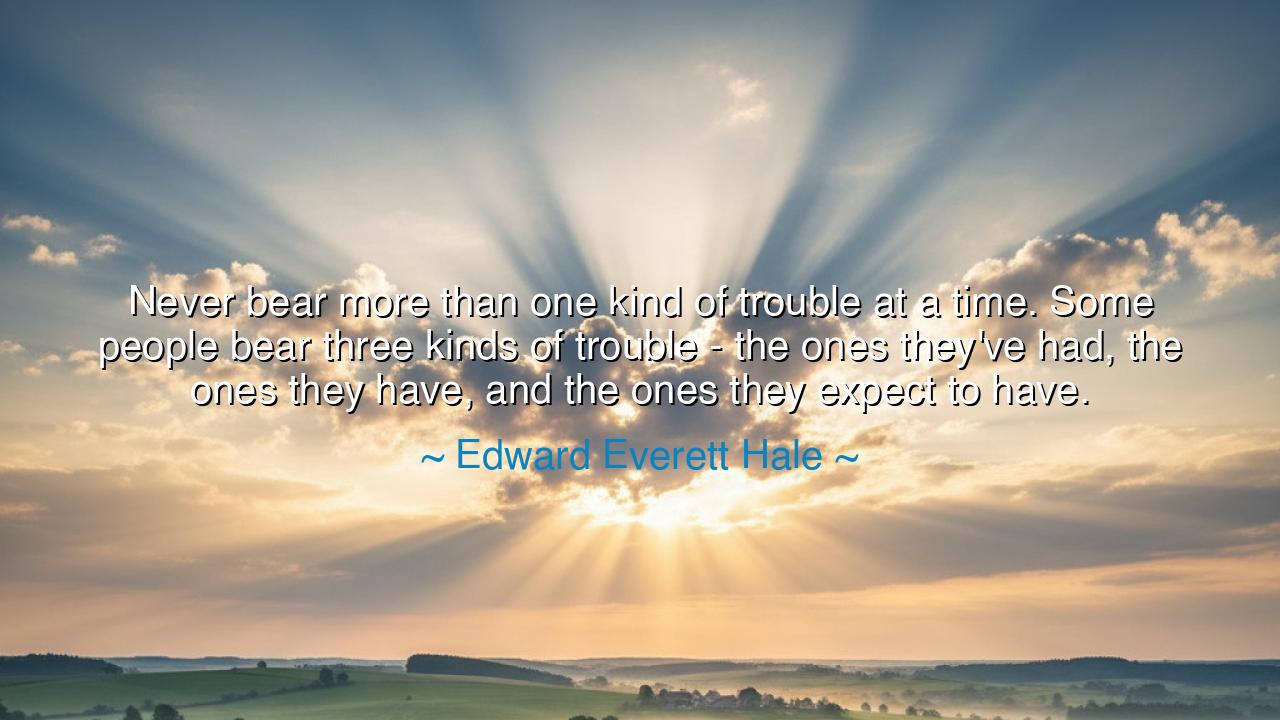
Never bear more than one kind of trouble at a time. Some people
Never bear more than one kind of trouble at a time. Some people bear three kinds of trouble - the ones they've had, the ones they have, and the ones they expect to have.






Hear the words of Edward Everett Hale, wise and steady: “Never bear more than one kind of trouble at a time. Some people bear three kinds of trouble—the ones they've had, the ones they have, and the ones they expect to have.” At first these words sound simple, but in truth they strike at the heart of human suffering. For the burden of life is heavy enough when carried in its own season; yet man, foolish and restless, multiplies his sorrow by binding himself not only to the pain of the present, but also to the shadows of the past and the phantoms of the future.
The ancients knew this danger well. They taught that memory and fear are twin thieves. Memory chains the soul to griefs already endured, refusing to let wounds heal. Fear shackles the spirit to pains not yet come, filling the heart with dread of what may never be. Thus a man may be crushed beneath three weights when he need only bear one. Hale’s teaching is a call to courage and discipline: to carry today’s trouble, but not yesterday’s, not tomorrow’s. For the past is gone, the future unseen, and only the present is given into our hands.
Consider the tale of Marcus Aurelius, emperor of Rome and philosopher of the Stoics. Surrounded by war and betrayal, he wrote in his meditations: “Never let the future disturb you. You will meet it, if you have to, with the same weapons of reason which today arm you against the present.” In these words we hear the same wisdom Hale declares. Marcus bore the empire’s burdens, yet he knew that to carry imagined troubles was to fall before the battle had even begun. By focusing only on the present, he found strength to endure.
And what of the man who carries all three troubles at once? He is like a traveler who loads his back with stones from the road already walked, heaps upon them the stones he carries now, and then ties yet more stones he imagines lie ahead. Such a man collapses not because the way is impossible, but because he has chosen to bear more than life requires. His downfall is not the cruelty of fate, but his own refusal to release what is gone and to trust what is to come.
Hale’s words also remind us that much of human suffering is self-inflicted. The past cannot be undone, yet we revisit it with endless regret. The future cannot be grasped, yet we fill it with worry. The present is small, yet manageable, if only we would give it our full strength. To live wisely is to divide time rightly: let the past instruct, but not enslave; let the future inspire, but not terrify; let the present occupy the fullness of your power.
The lesson is clear: bear only today’s burden. Do not fight yesterday’s battles again; they are already written in the scroll of time. Do not tremble before tomorrow’s storm; it may never come, and if it does, you will face it with new strength. Let your energy, your courage, your endurance be spent on what lies before you now. In this way, the load will be bearable, and the spirit unbroken.
Practical action must follow this wisdom. When sorrow of the past arises, release it with forgiveness. When fear of the future rises, meet it with trust. Begin each morning with the resolve: today’s troubles I will face; the rest I will leave aside. And at day’s end, lay down the burden, knowing you have carried what was yours to carry. This is the discipline of peace, the art of endurance, the path of resilience.
So remember Hale’s words: “Never bear more than one kind of trouble at a time.” Let them be a shield against regret and worry. For life will always bring trials, but they need not be multiplied by your own hand. Carry what is yours for this moment, and you will find that the weight, though heavy, is never more than you can bear. In this, you will walk with strength, with calm, and with wisdom worthy of the ancients.






AAdministratorAdministrator
Welcome, honored guests. Please leave a comment, we will respond soon